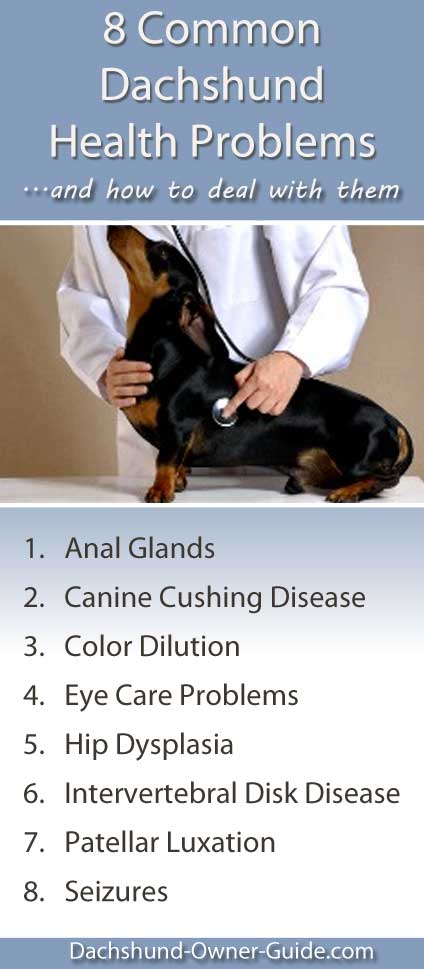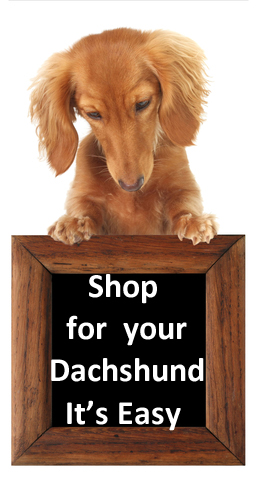Common Dachshund health problems
symptoms,preventions and treatments
"Learn about dachshund health problems "
Dachshund health problems are similar in both the standard and miniature size and also within the different coat varieties.
It is clear that spinal problems and other health problems are hereditary responsible breeders are endeavoring to eliminate these problems.
Be aware of encouraging too much jumping (on furniture - into car) as this causes shock on the disks, when lifting and carrying support his weight both front and rear, so his spine is not stressed.
Dachshunds are tough little dogs so these are just precautions,to help prevent any problems occurring. There is also a variety of high quality health supplements available, which can support your dachshunds overall health.
Most breeds are prone to certain health issues
Dachshund health problems include:
Anal Glands - in dogs are also known as “scent glands” as it is the secretion from these glads that marks the dog’s territory and identify other dogs.
These glads empty normally when the dog poops, a normal firm stool, if it is soft the gland will not empty. If these glads do not empty normally the dog will suffer discomfort signs of this are,
Some common signs include:
- Scooting along the floor on their bottom
- Licking or biting the anus
- Chasing their tail
- Finding it difficult to sit
- Smelly fishy breath after your dog has licked his bottom
Older dogs are more likely to have problems with anal glands, which may mean they need expressing every two weeks or perhaps even more often; it may be best for you to learn the procedure yourself.
I think the best idea is to go to your vet to have this done, most vets are happy to take the time to explain to you how to carry out the procedure and it is easier if you watch it being done first.
A herbal remedy AnalGlandz from PetAlive, assists anal glands to empty naturally. If you do need to express your dog’s anal sacs then this remedy makes the procedure easier.
This is a disease that is seen more often in older dachshunds. It is a serious disease that usually can be managed with medication. Learn more about the symptoms of the disease, and the treatments and care required.
Color Dilution Alopecia - this is a condition found in some dog breeds; coat colors like “blue or fawn” are more prone.
This is a genetic defect, of which there is no cure, although some puppies have problems from about 6 months old others appear normal for the first couple of years.
Affected dogs often start losing hair along the spine their coat becomes thin and patchy with skin dry, eventually most dogs lose all their hair.
Dogs affected by this problem can lead a normal happy life with a little extra care of the skin and perhaps a sweater in the cold.
The diluted dachshunds are popular now so owners need to be aware of the problem before choosing a puppy.
Dachshund dog owners need to be aware that the breed has some congenital eye problems some of these are include.
- Keratoconjunctivitis sicca (KCS) which is when the surface of the eyes become dry.
- Progressive retinal alrophy (RRA) this is a condition where the cells of the eye slowly die.
- Congenital cataracts this condition causes the eye lens to become opaque
Grooming is important with eye care, trimming hair out of eyes, cleaning eyes, treating infections like conjunctivitis promptly.
Hip dysplasia – is a genetic disorder that also involves environmental factors such as diet. It is the most common cause of rear leg lameness in dogs usually large-breeds but also effects dachshunds.
It is a deformity of the hip joint where the ball of the femur cannot fit properly into the hip socket and occurs during the animals growth period.
Factors that can cause a predisposition to hip dysplasia
- Feeding young dogs a very high calorie diet
- Dachshund being overweight
- Encouraging young dogs to jump up and down from a height where they land on their back legs,
Hip dysplasia can develop in very young dogs signs noticeable as young as 6 weeks but other dogs may not show any signs until 1 to 2 years old and some cases may not show pain or lameness until they are very old.
Some signs of hip dysplasia
- Hind leg lameness
- Bunny hop when running
- Have difficulty getting up
- Unsteady/swaying walk
- Pressing on rump will cause pelvis to drop
Visit the vet to have it checked out and assessed for treatment.
This is one of the common dachshund health problems, selective breeding from parents who show no sign of the disease is one way of preventing this condition. In less severe cases there is a possibility of recovery by treating with drugs, and complete rest.
Surgery is also an option in more severe cases. Some dietary supplements may be helpful in same cases. Over weight dogs are more prone to this disease.
Dachshund health problems such as Mammary Tumors - are tumors found in both male and female, spaying before the 1st heat cycle or neutering at an early age will reduce the risk of these tumors by 98%.
Most dogs have 5 mammary glands on each side 10 in total.The larger the breast tumor is the greater the risk of it spreading.
Not all tumors are malignant almost 50% found are benign. Treatment often involves surgery also chemotherapy.
It is important to watch your dachshund’s diet as you do not want your dog to get overweight, the extra weight puts strain on the spine and these dogs are predisposed to slipped or ruptured disks.
Regular exercise would assist in stopping this being one of the most common dachshund health problems.
There are a number of health problems and behavioral changes that affect older dogs, so owners need to be aware of what to look out for and how best to keep their older dachshund looking and feeling good, in their golden years.
Patellar Luxation - this is one of the most common dachshund health problems,this condition occurs when the knee cap pops out or dislocates out of the femoral groove. The femoral groove can become shallow and narrow as a result of luxation.
Dachshunds are not genetically prone to the problem; however because of their short legs, which changes the angle of the kneecap they are more likely to develop this condition.
Onset can be sudden your dog can be fine running around and suddenly go lame and be in pain, holding its leg then suddenly off he runs again, what just happened was the kneecap popped out and then returned to the correct position, all in a few minutes.
With a more serious problem the kneecap will not stay back in position or pops out all the time. Have your dog checked by your vet; if the condition is serious surgery may be required.
Some suggested treatments
- Maintain a healthy weight
- Keep up exercise program
- Provide your dog with oral joint support supplements
- Provide supplements that build and maintain cartilage
- Feed your dachshund and anti-inflammatory diet ( low in carbohydrates)
Seizures - These may be diagnosed as epilepsy if the seizures are repeated and for no particular reason these may be controlled with medication.
Ask a Vet Online
For peace of mind for those nagging non urgent health questions you have about your dachshund,why not ask a vet online at Just Answers and put your mind at rest.
Even if you just have a general doxie health question or behavioral problem and get your answer within a very short time often within a few minutes.
Easy to use at a fraction of the cost,cutting those unnecessary vet bills.
We have personally used Ask a Vet online at "Just Answer", we found it easy to use and received a satisfactory reply within minutes.
You only pay when you accept the answer.
Check with your vet on any other dachshund health problems that you may feel your dog has developed.
The service that Just Answer provides is for general information and are not intended to substitute your vets professional advice.
Return to topOther pages of interest
Return from dachshund health problems to home page
The information given on this site,is compiled from our
knowledge and research and is designed to supplement
not replace your vets or other professionals advice.
Copyright 2019 All rights reserved
www.dachshund-owner-guide.com
Solo Build It!






